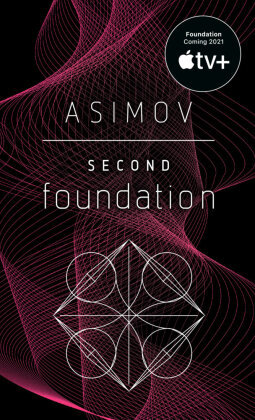| Verlag | Bantam Books |
| Auflage | 2004 |
| Seiten | 272 |
| Format | 10,6 x 17,5 x 1,7 cm |
| Gewicht | 150 g |
| Artikeltyp | Englisches Buch |
| Reihe | The Foundation Novels 4 |
| ISBN-10 | 0553293362 |
| EAN | 9780553293364 |
| Bestell-Nr | 55329336EA |
The third novel in Isaac Asimov\'s classic science-fiction masterpiece, the Foundation series
The Foundation lies in ruins-destroyed by a mutant mind bent on humanity\'s annihilation. But it\'s rumored that there\'s a Second Foundation hidden somewhere at the end of the Galaxy, established as insurance to preserve the knowledge of mankind. Now a desperate race has begun between the survivors of the First Foundation and an alien entity to find this last flicker of humanity\'s shining past-and future hope. Yet the key to it all might be a fourteen-year-old girl burdened with a terrible secret. Is she the Foundation\'s savior-or its deadliest enemy?
Unforgettable, thought-provoking, and riveting, Second Foundation is a stunning novel of adventure and ideas writ huge across the Galaxy-a powerful tale of humankind\'s struggle to preserve the fragile light of wisdom against the threat of its own dark barbarism.
Leseprobe:
THE MULE It was after the fall of the First Foundation that the constructive aspects of the Mule\'s regime took shape. After the definite break-up of the first Galactic Empire, it was he who first presented history with a unified volume of space truly imperial in scope. The earlier commercial empire of the fallen Foundation had been diverse and loosely knit, despite the impalpable backing of the predictions of psychohistory. It was not to be compared with the tightly controlled "Union of Worlds" under the Mule, particularly during the era of the so-called Search. . . .
ENCYCLOPEDIA GALACTICA
1
TWO MEN AND THE MULE
There is much more that the Encyclopedia has to say on the subject of the Mule and his Empire but almost all of it is not germane to the issue at immediate hand, and most of it is considerably too dry for our purposes in any case. Mainly, the article concerns itself at this point with the economic conditions that led to the rise of the "First Citizen of the Union"--the Mule\'s official title--and with the economic consequences thereof.
If, at any time, the writer of the article is mildly astonished at the colossal haste with which the Mule rose from nothing to vast dominion in five years, he conceals it. If he is further surprised at the sudden cessation of expansion in favor of a five-year consolidation of territory, he hides the fact.
We therefore abandon the Encyclopedia and continue on our own path for our own purposes and take up the history of the Great Interregnum--between the First and Second Galactic Empires--at the end of that five years of consolidation.
Politically, the Union is quiet. Economically, it is prosperous. Few would care to exchange the peace of the Mule\'s steady grip for the chaos that had preceded. On the worlds that five years previously had known the Foundation, there might be a nostalgic regret, but no more. The Foundation\'s leaders were dead, where useless; and Converted, where useful.
And of the Converted, themost useful was Han Pritcher, now lieutenant general.
In the days of the Foundation, Han Pritcher had been a captain and a member of the underground Democratic Opposition. When the Foundation fell to the Mule without a fight, Pritcher fought the Mule. Until, that is, he was Converted.
The Conversion was not the ordinary one brought on by the power of superior reason. Han Pritcher knew that well enough. He had been changed because the Mule was a mutant with mental powers quite capable of adjusting the conditions of ordinary humans to suit himself. But that satisfied him completely. That was as it should be. The very contentment with the Conversion was a prime symptom of it, but Han Pritcher was no longer even curious about the matter.
And now that he was returning from his fifth major expedition into the boundlessness of the Galaxy outside the Union, it was with something approaching artless joy that the veteran spaceman and Intelligence agent considered his approaching audience with the "First Citizen." His hard face, gouged out of a dark, grainless wood that did not seem to be capable of smiling without cracking, didn\'t show it--but the outward indications were unnecessary. The Mule could see the emotions within, down to the smallest, much as an ordinary man could see the twitch of an eyebrow.
Pritcher left his air car at the old vice-regal hangars and entered the palace grounds on foot as was required. He walked one mile along the arrowed highway--which was empty and silent. Pritcher knew that over the square miles of palace grounds, there was not one guard, not one soldier, not one armed man.
The Mule had need of no protection.
The Mule was his own best, all-powerful protector.
Pritcher\'s footsteps beat softly in his own ears, as the palace reared its gleaming, incredibly light and incredibly strong metallic

